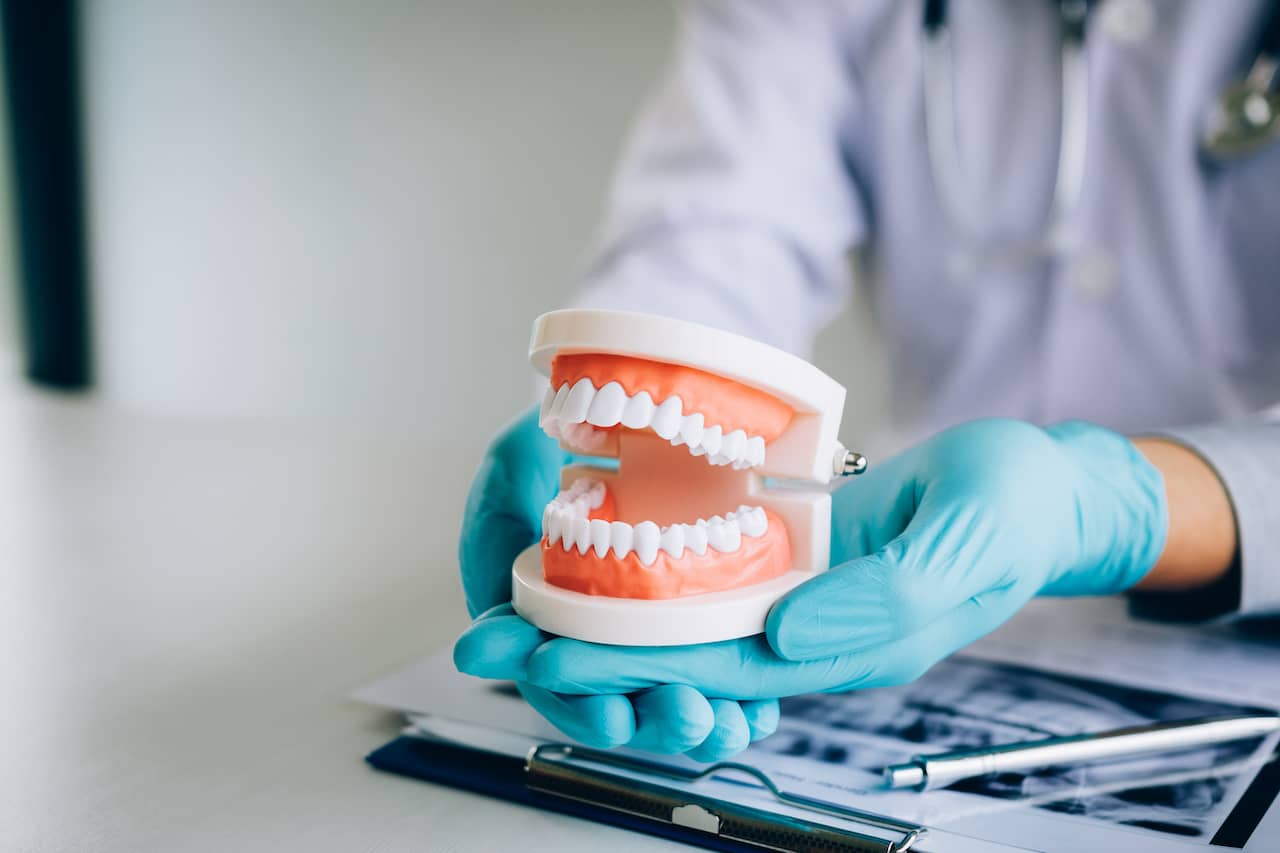
How Often Do Dentures Need to Be Replaced?
By David Hudnall, DMD
Dentures can be a life-altering transformation, especially if you’ve been dealing with bad teeth for some time. Dentures help to enhance every action involving your mouth, from smiling to talking to chewing.
Often people get dentures thinking that all of their problems are solved for the rest of their lives. However, dentures are never a permanent tooth replacement solution. From full dentures to partial dentures or all varieties of artificial teeth – every denture undergoes significant wear and tear from normal use and will eventually require replacement. This guide is designed to discuss the things you need to know when it comes to denture replacement.
Signs That Your Dentures Need to Be Replaced
Issues with your dentures can indicate that your denture may need to be replaced. Many patients get a denture, become accustomed to how it feels in their mouth, and don’t want to give it up, even though it becomes uncomfortable to wear. In their mind, they still believe that it fits the same as it once did, even though any dental professional can see otherwise. Uncomfortable or broken dentures are a sign that something is wrong. Here are some of the red flags that denture wearers should look for.
Damage
Breakage, hairline cracks, discolored acrylic, teeth falling out, and dark stains at the junction of the denture teeth that won’t come off are all indications of denture wear and tear. A denture repair could be a temporary option to carry you through until you can have a new denture made. However, once dentures break and have required more than one repair, it just doesn’t make sense to keep pouring money into a worn denture.
Sores on gums
If your gums have changed since the denture was originally made (and everyone’s does), it no longer fits correctly. Your dentist can examine your denture to determine if relining the denture is likely to make a difference in the fit and extend the denture’s life. Otherwise, it is best to start with a new denture that is made to fit the shape of your gums as they are today.
Difficulty Chewing
When you have problems chewing, the bite requires adjustment. However, if the teeth are noticeably worn or flattened, no amount of adjusting or increased bite force will improve your ability to chew. Denture teeth are man-made and wear out over time, causing them to become dull.
Speech Problems
Speech problems can be caused by several factors: dentures that slip, denture borders that are the wrong length, excessively thick acrylic, too much denture adhesive, or improperly positioned teeth. Aside from thinning the acrylic to eliminate whistling when you speak, new dentures are usually the solution.
Altered Facial Appearance
If your facial features appear to have collapsed or you have a sunken appearance, your dentures may no longer adequately support your facial muscles. Additionally, worn denture teeth accentuate wrinkles and allow your lips to overclose and disappear at rest, causing the corners of your mouth to stay chapped. These are signs that you need to replace your dentures.
Looseness
It is normal for lower dentures to feel loose. After all, they don’t usually gain suction and just rest against the gum tissue. But a chronically loose lower denture you cannot control with your tongue is a sign of ill-fitting dentures.
Denture Maintenance and Upkeep
Regular maintenance is essential if you expect your dentures to serve you well. Here are dentist-prescribed denture care guidelines for maintaining and extending the usefulness of your dentures:
Daily Denture Care
Remove your dentures from your mouth over a basin of water or several thicknesses of towels. That way, should the dentures slip, they are less likely to break. Use a denture brush and liquid dishwashing soap or a denture cleaning paste to brush away plaque and debris. Rinse under cool, running water. Place dentures in a sealed container of cool water or effervescent denture cleaning solution for added freshness.
Good Hygiene Habits
Don’t forget to clean and stimulate the blood flow to your gum tissue and tongue using a soft bristle toothbrush or a moistened washcloth. In order to minimize fungal overgrowth that can lead to thrush, always remove your dentures before sleeping.
Avoid Harmful Chemicals
Only clean dentures with products designed for cleaning dentures. Abrasive cleaners cause acrylic pitting, allowing the denture to harbor harmful bacteria that can affect your overall health. This means never place dentures in hot water or use household bleach or cleansers, even if the dentures were dropped in the toilet! Reserve toothpaste for cleaning natural teeth. Toothpaste contains abrasives that will flatten and wear away denture teeth.
Never Perform Self-Adjustments
If your denture is not comfortable or you have an improper fit, leave it to the professionals. You don’t have the equipment necessary at home to properly adjust your denture—most people who do end up ruining their dentures.
Storing Dentures
Always keep dentures submerged in water inside a sealed container and out of the reach of children and pets when they are not in your mouth. Dentures are attractive to children because, to them, they look like a toy. Pets like their owner’s scent and will often chew on the denture material, causing so much damage that the dentures cannot be repaired.
Visit the Dentist Regularly
Patients who wear dentures need to see a dental professional at least once every year for proper care. This allows the dentist to catch and address any issues before they become a bigger problem. In general, dentures are relined every one to two years to fit properly. But this can differ for every patient depending on how much the gum tissue and bone structure have changed.
How Often Do Dentures Need to Be Replaced?
Many patients brag about wearing the same dentures their entire life, although no dentist would ever advise doing this. Regardless of whether you have full or partial dentures a 10+ life span isn’t advisable. Even with excellent care, dentures don’t last forever. A 2021 study published in the Journal of Prosthetic Dentistry suggests that dentures definitely have limited longevity, with upper dentures typically lasting longer than lower dentures.
It is generally accepted among dentists and insurance carriers that traditional acrylic dentures last about five years before they require replacement. Dentures made from newer, high-quality resins last longer, up to 10 years on average. However, the age of the denture is not the only determining factor for replacing dentures. Any time you begin to have issues with your dentures seek a dental professional’s advice. Sometimes it’s possible to correct a minor problem with an adjustment or improve the fit with a reline.
Superior Denture Replacement at European Denture Center
Why are there different styles and price points for dentures? Less expensive dentures are appropriate as short-term tooth replacement solutions, such as getting dentures after teeth have been removed. Dentures made from higher-quality materials look lifelike and tend to last longer.
Depending upon your goals, the denturists at European Denture Center will recommend the best choice to address your needs, wants, and desires within your budget. Don’t you deserve the best denture possible? Set your consultation appointment today to find out how life-changing really comfortable dentures can be!


